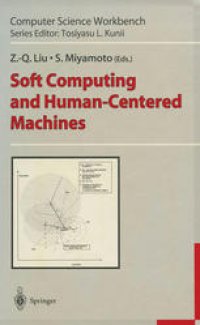
Ebook: Soft Computing and Human-Centered Machines
- Tags: Artificial Intelligence (incl. Robotics), Mathematics of Computing
- Series: Computer Science Workbench
- Year: 2000
- Publisher: Springer Japan
- Language: English
- pdf
Today's networked world and the decentralization that the Web enables and symbolizes have created new phenomena: information explosion and saturation. To deal with information overload, our computers should have human-centered functionality and enhanced intelligence, but instead they simply become faster. Soft computing is a unifying framework that combines techniques in neural networks, fuzzy theory, genetic algorithms, and artificial intelligence to develop intelligent systems able to learn in dynamic, imprecise, and uncertain environments. This book explains the theory, methodology, and application aspects of human-centered systems, showing how it is possible to extend to machines such techniques as dynamic cognitive learning, neural-fuzzy-based learning, and genetic-evolutionary type learning paradigms.
Today's networked world and the decentralization that the Web enables and symbolizes have created new phenomena: information explosion and saturation. To deal with information overload, our computers should have human-centered functionality and enhanced intelligence, but instead they simply become faster. Soft computing is a unifying framework that combines techniques in neural networks, fuzzy theory, genetic algorithms, and artificial intelligence to develop intelligent systems able to learn in dynamic, imprecise, and uncertain environments. This book explains the theory, methodology, and application aspects of human-centered systems, showing how it is possible to extend to machines such techniques as dynamic cognitive learning, neural-fuzzy-based learning, and genetic-evolutionary type learning paradigms.
Content:
Front Matter....Pages I-XVIII
Introduction....Pages 1-7
Multisets and Fuzzy Multisets....Pages 9-33
Modal Logic, Rough Sets, and Fuzzy Sets....Pages 35-55
Fuzzy Cognitive Maps: Analysis and Extensions....Pages 57-84
Methods in Hard and Fuzzy Clustering....Pages 85-129
Soft-Competitive Learning Paradigms....Pages 131-161
Aggregation Operations for Fusing Fuzzy Information....Pages 163-187
Fuzzy Gated Neural Networks in Pattern Recognition....Pages 189-214
Soft Computing Technique in Kansei (Emotional) Information Processing....Pages 215-248
Vagueness in Human Judgment and Decision Making....Pages 249-281
Chaos and Time Series Analysis....Pages 283-298
A Short Course for Fuzzy Set Theory....Pages 299-327
Today's networked world and the decentralization that the Web enables and symbolizes have created new phenomena: information explosion and saturation. To deal with information overload, our computers should have human-centered functionality and enhanced intelligence, but instead they simply become faster. Soft computing is a unifying framework that combines techniques in neural networks, fuzzy theory, genetic algorithms, and artificial intelligence to develop intelligent systems able to learn in dynamic, imprecise, and uncertain environments. This book explains the theory, methodology, and application aspects of human-centered systems, showing how it is possible to extend to machines such techniques as dynamic cognitive learning, neural-fuzzy-based learning, and genetic-evolutionary type learning paradigms.
Content:
Front Matter....Pages I-XVIII
Introduction....Pages 1-7
Multisets and Fuzzy Multisets....Pages 9-33
Modal Logic, Rough Sets, and Fuzzy Sets....Pages 35-55
Fuzzy Cognitive Maps: Analysis and Extensions....Pages 57-84
Methods in Hard and Fuzzy Clustering....Pages 85-129
Soft-Competitive Learning Paradigms....Pages 131-161
Aggregation Operations for Fusing Fuzzy Information....Pages 163-187
Fuzzy Gated Neural Networks in Pattern Recognition....Pages 189-214
Soft Computing Technique in Kansei (Emotional) Information Processing....Pages 215-248
Vagueness in Human Judgment and Decision Making....Pages 249-281
Chaos and Time Series Analysis....Pages 283-298
A Short Course for Fuzzy Set Theory....Pages 299-327
....
Today's networked world and the decentralization that the Web enables and symbolizes have created new phenomena: information explosion and saturation. To deal with information overload, our computers should have human-centered functionality and enhanced intelligence, but instead they simply become faster. Soft computing is a unifying framework that combines techniques in neural networks, fuzzy theory, genetic algorithms, and artificial intelligence to develop intelligent systems able to learn in dynamic, imprecise, and uncertain environments. This book explains the theory, methodology, and application aspects of human-centered systems, showing how it is possible to extend to machines such techniques as dynamic cognitive learning, neural-fuzzy-based learning, and genetic-evolutionary type learning paradigms.
Content:
Front Matter....Pages I-XVIII
Introduction....Pages 1-7
Multisets and Fuzzy Multisets....Pages 9-33
Modal Logic, Rough Sets, and Fuzzy Sets....Pages 35-55
Fuzzy Cognitive Maps: Analysis and Extensions....Pages 57-84
Methods in Hard and Fuzzy Clustering....Pages 85-129
Soft-Competitive Learning Paradigms....Pages 131-161
Aggregation Operations for Fusing Fuzzy Information....Pages 163-187
Fuzzy Gated Neural Networks in Pattern Recognition....Pages 189-214
Soft Computing Technique in Kansei (Emotional) Information Processing....Pages 215-248
Vagueness in Human Judgment and Decision Making....Pages 249-281
Chaos and Time Series Analysis....Pages 283-298
A Short Course for Fuzzy Set Theory....Pages 299-327
Today's networked world and the decentralization that the Web enables and symbolizes have created new phenomena: information explosion and saturation. To deal with information overload, our computers should have human-centered functionality and enhanced intelligence, but instead they simply become faster. Soft computing is a unifying framework that combines techniques in neural networks, fuzzy theory, genetic algorithms, and artificial intelligence to develop intelligent systems able to learn in dynamic, imprecise, and uncertain environments. This book explains the theory, methodology, and application aspects of human-centered systems, showing how it is possible to extend to machines such techniques as dynamic cognitive learning, neural-fuzzy-based learning, and genetic-evolutionary type learning paradigms.
Content:
Front Matter....Pages I-XVIII
Introduction....Pages 1-7
Multisets and Fuzzy Multisets....Pages 9-33
Modal Logic, Rough Sets, and Fuzzy Sets....Pages 35-55
Fuzzy Cognitive Maps: Analysis and Extensions....Pages 57-84
Methods in Hard and Fuzzy Clustering....Pages 85-129
Soft-Competitive Learning Paradigms....Pages 131-161
Aggregation Operations for Fusing Fuzzy Information....Pages 163-187
Fuzzy Gated Neural Networks in Pattern Recognition....Pages 189-214
Soft Computing Technique in Kansei (Emotional) Information Processing....Pages 215-248
Vagueness in Human Judgment and Decision Making....Pages 249-281
Chaos and Time Series Analysis....Pages 283-298
A Short Course for Fuzzy Set Theory....Pages 299-327
....
Download the book Soft Computing and Human-Centered Machines for free or read online
Continue reading on any device:

Last viewed books
Related books
{related-news}
Comments (0)